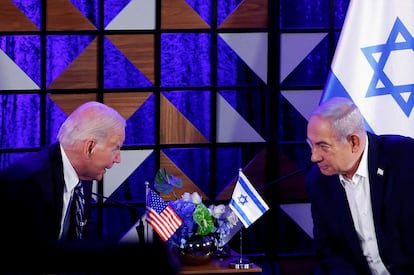US State Secretary Blinken announces new Middle East trip to push for Gaza ceasefire
President Biden on Monday warned Israeli PM Netanyahu that an attack on Rafah would ‘deepen the anarchy’ in the Palestinian enclave, where aid agencies warn that a famine is imminent

U. S. Secretary of State Antony Blinken will visit the Middle East this week with the goal of reaching a ceasefire agreement between Israel and Hamas and securing the release of hostages, the official said on Tuesday during a visit to the Philippines. Blinken said his trip to meet senior leaders in Saudi Arabia and Egypt would aim to “discuss the right architecture for lasting regional peace.”
“One hundred percent of the Gaza population is in need of humanitarian assistance,” Blinken said, adding that it was “absolutely incumbent” upon Israel to prioritize assistance for those in desperate need.
U.S. President Joe Biden has warned Israeli Prime Minister Benjamin Netanyahu that a military operation like the one Israel is planning in Rafah would “deepen the anarchy” in Gaza, according to National Security Adviser Jake Sullivan. Both leaders spoke by phone for 45 minutes, at a time of particular tension between the two administrations in the more than five months of war in the Gaza Strip, due to disagreements over humanitarian aid and the management of the conflict. The conversation occurred after the highest-ranking Democrat in the Senate, Charles Schumer, described Netanyahu as an “obstacle to peace,” said that “he has lost his way” and called for early elections in the allied country.
“A major ground operation there would be a mistake,” Sullivan told journalists on Monday. “It would lead to more innocent civilian deaths, worsen the already dire humanitarian crisis, deepen the anarchy in Gaza and further isolate Israel internationally.”
One of the practical results of the talk is that Israel will send a delegation to Washington to listen to the U.S. government’s concerns about the ground operation that Israel is planning in Rafah, and offer alternative plans to dismantle the Hamas militia without an all-out assault on a city that has become the last refuge for more than a million Palestinians. The conversation took place as the World Food Programme warned of an “imminent” famine in northern Gaza.
Netanyahu limited himself to broadcasting a 24-second video in Hebrew in which he seemed to justify — especially with a view to Israeli sectors in favor of further limiting the entry of food into Gaza — the importance of meeting the demands of the White House. In the recording, he says that he told Biden that Israel is committed to achieving all the objectives of the war: eliminating Hamas, bringing back the hostages and ensuring that Gaza never again poses a threat to Israel, while providing the necessary humanitarian aid to help meet those objectives.
Rafah, on the border with Egypt, is the last area that the Israeli army has not yet invaded, and more than half of the 2.3 million Gazans forcibly displaced from other parts of Gaza are now living there in deplorable conditions.
The Israeli prime minister did not mention Rafah in his video message, although the day before he had insisted that his army would invade the city and that the process would take several weeks. Washington is demanding a “credible” protection plan for the 1.4 million Palestinian civilians sheltering there, and Biden has warned that an indiscriminate Israeli attack on Rafah would mean crossing a “red line.”
The call was the first since February 15. Since that date, the statements by both leaders have revealed a growing rift, as the catastrophic humanitarian situation in Gaza deepens. In the United States, the primaries have revealed that a section of Democratic voters are unhappy about the Biden administration’s support for Israel in the war.
Sign up for our weekly newsletter to get more English-language news coverage from EL PAÍS USA Edition
Tu suscripción se está usando en otro dispositivo
¿Quieres añadir otro usuario a tu suscripción?
Si continúas leyendo en este dispositivo, no se podrá leer en el otro.
FlechaTu suscripción se está usando en otro dispositivo y solo puedes acceder a EL PAÍS desde un dispositivo a la vez.
Si quieres compartir tu cuenta, cambia tu suscripción a la modalidad Premium, así podrás añadir otro usuario. Cada uno accederá con su propia cuenta de email, lo que os permitirá personalizar vuestra experiencia en EL PAÍS.
¿Tienes una suscripción de empresa? Accede aquí para contratar más cuentas.
En el caso de no saber quién está usando tu cuenta, te recomendamos cambiar tu contraseña aquí.
Si decides continuar compartiendo tu cuenta, este mensaje se mostrará en tu dispositivo y en el de la otra persona que está usando tu cuenta de forma indefinida, afectando a tu experiencia de lectura. Puedes consultar aquí los términos y condiciones de la suscripción digital.








































